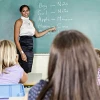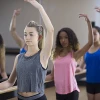15 careers found.
Art teachers in secondary schools teach students the practical skills, theory and history of art. Students receive tuition in aspects such as painting, drawing, printmaking, photography, sculpture and ceramics. Art teachers may specialise in one or more aspects of art in their tertiary studies (such as history and appreciation of art, ceramics, drawing, film and video, painting, pottery, printmaking, sculpture and visual communication), as well as studying the elements of design, graphics, product design and environmental studies.
Early childhood teachers plan and conduct education programmes for young children while helping them learn early social, cognitive and physical life skills.
Teachers of English as a Second Language (ESL) teach, and assist other teachers to teach, students whose first language or dialect is not Standard Australian English to become proficient with the English language.
Music teachers develop students' interest in and appreciation of music through teaching theory, history and practical skills. They help students of all skills forge musical abilities or an interest in the area.
Physical education (PE) teachers instruct students in sports, recreational activities and healthy lifestyle issues, in order to encourage and develop physical fitness and skills, self-esteem and interpersonal skills.
Primary school teachers educate primary school children by planning and conducting an education programme to develop literacy and numeracy, as well as the physical, emotional, intellectual and social growth of their students. Primary school teachers are usually trained to teach the whole curriculum.
Secondary school teachers teach one or more subjects within the school curriculum to secondary students. Subject areas include English, mathematics, science, history, geography, drama, dance, art, music, health and physical education, design, information technology, languages other than English, and home economics.
Special education teachers develop and conduct learning programmes for preschool, primary and secondary students who have learning difficulties or an impairment in their physical, sensory, emotional or intellectual abilities. Some also teach students who are intellectually gifted.
Counsellors assist people to identify and define their emotional issues and better understand themselves by explaining options, setting goals, providing therapy and helping them to take action. Counsellors may specialise in working with a particular group, such as people from non-English-speaking backgrounds, Aboriginal and Torres Strait Islander people or single parents. Alternatively, they may specialise in a service area such as health, drug and alcohol problems, accommodation, relationships, employment, grief and loss, stress management, child development or abuse issues.
Dancers are performers who entertain audiences by dancing as soloists, with a partner or as members of a group. There are many styles of dance, including ballet, contemporary, Aboriginal and Torres Strait Islander, folk, jazz, ballroom and tap. Dancers may perform using a variety of styles, or they may specialise in one particular dance style.
Education aides assist teachers with the supervision and support of students and the delivery of learning programmes. They also provide support and assistance to students with special needs, including those with physical or intellectual disabilities, or behavioural issues.
Home economists teach, inform and advise government, industry and the community in order to assist individuals to make better lifestyle choices.
Orientation and mobility specialists teach people who are blind or have low vision to move around their environment safely and with confidence. They usually work on a one-to-one basis.
Religious leaders are responsible for leading worship, and providing guidance and instruction to members of their faith, sect or tribe. They are also responsible for any associated administrative duties. The term 'religious leader' covers a range of titles and functions such as Aboriginal ceremonial celebrant, chaplain, imam, minister, missionary, monk, nun, pastor, priest, rabbi, religious brother/sister, religion teacher, religious counsellor and religious youth leader.
Vocational Education and Training (VET) lecturers teach vocational courses connected with specific industries and areas of work to help people enter or re-enter the workforce.












